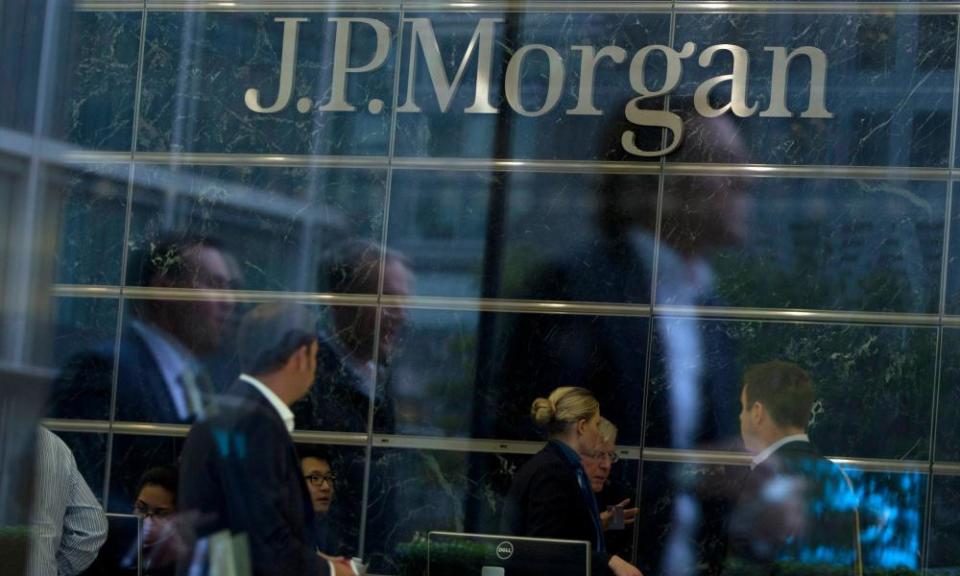JP Morgan appears to make good on Brexit threat with new Dublin office

US bank JP Morgan is buying a landmark office building in Dublin in a significant boost for the Irish capital as European cities compete to lure financial institutions away from London in the wake of the Brexit vote.
The new premises will be able to house 1,000 staff – double the number of personnel the US bank currently employs in Dublin. The move is regarded as the first major expansion in Ireland by a financial services firm since the UK’s referendum.
The building is in the the flagship Capital Dock development in Dublin’s docklands, which is due to be completed in the latter part of 2018.
There has been speculation about the US bank’s intentions of buying a Dublin building for weeks and earlier this month the bank included the Irish capital in its list of three main bases in the EU from which it will carry out the activities it used to perform in London.
As the new office deal was announced Carin Bryans, the senior country officer for JP Morgan in Ireland, said: “Given the momentum of our local businesses, this new building gives us room to grow and some flexibility within the European Union. Dublin has the vibrant business and technology communities that suit a global firm like ours.”
The announcement coincided with a report in the Financial Times revealing that JP Morgan intends to hire more staff in Dublin for its custody operations, which look after the investments of major investors, hedge funds and big companies.
James Kenny, JP Morgan’s head of investor services, told the FT that the bank intended to hire a “significant” number of staff in Dublin to expand the custody business. “Growth plans are driving our real estate plan,” Kenny said.
The office would also seem likely to allow the bank to make preparations for Brexit. JP Morgan has previously said it needs to be ready for a situation where there is not a deal over passporting – the means by which firms operate seamlessly across the EU – for the UK after Brexit.
JP Morgan is being scrutinised because, in the run-up to the EU referendum last June, the bank’s chief executive Jamie Dimon stood alongside the then chancellor, George Osborne, to warn that up to 4,000 roles could be lost.
Last week, it warned it might have to move staff – possibly as many as 1,000 from the City of London – as a result of Brexit It employs 16,000 people across the UK, with about 11,000 in the City and 4,000 in Bournemouth – it is the biggest private sector employer in Dorset – with the remainder in Scotland.
Details are starting to emerge about Brexit plans after the Bank of England instructed major financial firms to put contingency plans in place and explain to Threadneedle Street by 14 July how they were preparing for “all eventualities”.
Other banks are also preparing to bulk up their businesses outside London, although it is thought that activities will fragment across the EU rather that settle in a single financial centre.
Dublin is not just trying to attract banks. The Central Bank of Ireland has said it has received a “high level of interest” from financial firms which carry out their European operations from the UK. It says it has received five applications relating to the insurance sector, had received signals that five other firms were going to apply and had been contacted by 20 others to discuss authorisation.
But it is not the only capital mentioned by firms. Richard Gnodde, the head of European operations at Goldman Sachs, has said he would need more people in Madrid, Milan, Paris and other EU centres.
Deutsche Bank has said that up to 4,000 jobs from its UK workforce of 9,000 could be moved to Frankfurt and other locations in the EU because of uncertainty about Britain’s relationship with the remaining 27 countries in the EU. Standard Chartered, the London-headquartered emerging markets bank, has also picked Frankfurt for a new subsidiary. HSBC has said 1,000 roles will go to Paris.
Lloyd’s of London, the insurance market, is opening up in Brussels although some firms are playing down the impact on their business. Last week, Barclays said Brexit was “a wholly manageable challenge” and it would not need to shift British jobs or significant operations elsewhere.

 Yahoo Finance
Yahoo Finance 